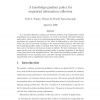Free Online Productivity Tools
i2Speak
i2Symbol
i2OCR
iTex2Img
iWeb2Print
iWeb2Shot
i2Type
iPdf2Split
iPdf2Merge
i2Bopomofo
i2Arabic
i2Style
i2Image
i2PDF
iLatex2Rtf
Sci2ools
122
click to vote
SIAMCO
2008
2008
A Knowledge-Gradient Policy for Sequential Information Collection
In a sequential Bayesian ranking and selection problem with independent normal populations and common known variance, we study a previously introduced measurement policy which we refer to as the knowledge-gradient policy. This policy myopically maximizes the expected increment in the value of information in each time period, where the value is measured according to the terminal utility function. We show that the knowledge-gradient policy is optimal both when the horizon is a single time period, and in the limit as the horizon extends to infinity. We show furthermore that, in some special cases, the knowledge-gradient policy is optimal regardless of the length of any given fixed total sampling horizon. We bound the knowledge-gradient policy's suboptimality in the remaining cases, and show through simulations that it performs competitively with or significantly better than other policies.
| Added | 14 Dec 2010 |
| Updated | 14 Dec 2010 |
| Type | Journal |
| Year | 2008 |
| Where | SIAMCO |
| Authors | Peter Frazier, Warren B. Powell, Savas Dayanik |
Comments (0)

